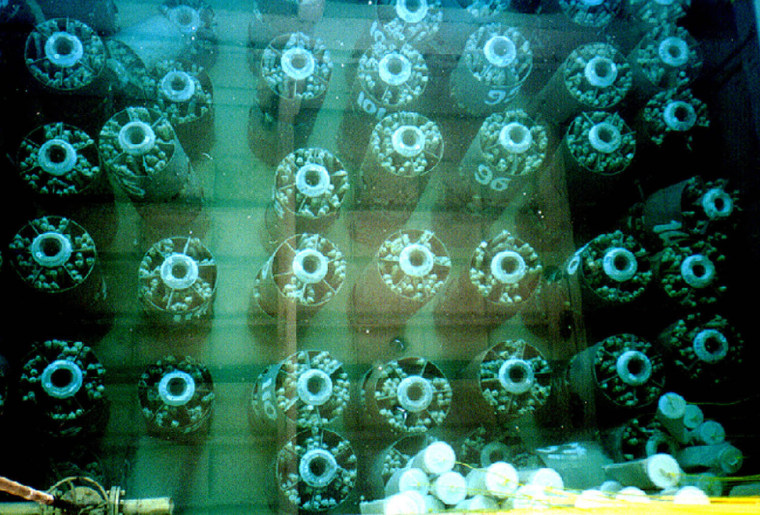Secretive North Korea detailed for the first time its expanded nuclear program on Tuesday, saying it had thousands of working centrifuges, as pressure built on China to rein in its ally amid tensions on the peninsula.
Pyongyang's revelations about its uranium enrichment, which gives it a second route to make a nuclear bomb, came a week after it fired an artillery barrage at a South Korean island, killing four people including two civilians.
Although North Korean rhetoric remained high — the country warned the U.S.-South Korea military drills could trigger "full-blown war" — a senior North Korean official left Pyongyang for talks with leaders in China.
Experts have voiced surprise at the sophistication of a uranium enrichment plant and light-water reactor at the North's main nuclear complex, which were shown to a U.S. scientist earlier this month.
"Currently construction of a light-water reactor is in progress actively and a modern uranium enrichment plant equipped with several thousands of centrifuges, to secure the supply of fuels, is operating," the Rodong Sinmun newspaper reported.
"Nuclear energy development projects will become more active for peaceful purpose in the future," added the paper, according the state news agency KCNA.
North Korea has conducted two nuclear tests to date and is believed to have enough fissile material from its plutonium-based program to make between six and 12 bombs.
It is impossible to verify the North's uranium enrichment program, which it first announced last year. International inspectors were expelled from the country last year, but Washington has said since 2002 that it suspected Pyongyang had such a program.
By staging provocations and flexing its nuclear muscle, analysts say the isolated North is seeking to increase its leverage as it pushes for a resumption of talks with regional powers, which it walked out of two years ago, in return for aid.
Andrei Lankov, a North Korea expert at Seoul's Kookmin University, said Pyongyang was simply following its typical pattern of behavior.
"For the last two years, both Washington and Seoul have tried to ignore them, so now they use both artillery and centrifuges to say: 'we are here, we are dangerous, and we cannot be ignored. We can make a lot of trouble, but also we behave reasonably if rewarded generously enough'," Lankov wrote on the East Asia Forum website.
3-way meeting in U.S.
South Korea's Foreign Ministry said on Tuesday the North's nuclear program, last week's attack on Yeonpyeong island and a Chinese proposal for emergency talks would be raised at meeting of foreign ministers in Washington in early December.
South Korea, Japan and the United States, three of the six countries involved in the on-off disarmament talks, will attend the meeting.
Talks host China has proposed a summit meeting of the six parties that have been trying to rein in North Korea's nuclear program. Russia and North Korea are also part of that group.
The United States wants China to use its leverage to restrain its ally North Korea, which fired shells at Yeonpyeong island in the first attack on civilians on South Korean soil since the end of the Korean war in 1953.
"We're certainly in close consultations with China ... and obviously we look to China to play a responsible leadership role in working to maintain peace and security in that region," U.S. Ambassador to the United Nations Susan Rice said.
New Wikileaks revelations, purporting to be from U.S. State Department cables and published by several Western papers, raised questions about the future of the relationship between China and North Korea which has in the past been described as being as close as "lips and teeth."
The U.S. and South Korean militaries started a third day of large-scale joint exercises off the peninsula's west coast on Tuesday in a show of force they say is meant to deter Pyongyang from staging further provocations.
Warning of 'full-blown war'On Tuesday, the North's propaganda machine issued a warning that the South Korea-U.S. drills, involving nuclear-powered U.S. supercarrier, could trigger a "full-blown war" on the peninsula.
"Our republic has a war deterrent that can annihilate any aggressor at once," the Pyongyang's government-run Minju Joson said in a commentary. "A northward provocative war means a self-destruction."
On the streets of Pyongyang, North Koreans spoke with pride of their military.
"Those who like fire are bound to be punished with fire," Kim Yong Jun, a Pyongyang resident, told international broadcaster APTN. "If the U.S. imperialists and South Korean puppets continue to gather the clouds of war, the Korean army and people will never forgive them."
Yonhap news agency reported that Choe, the North Korean official, will stay in China for five days and was invited by Wu Bangguo, chairman of the rubber-stamp National People's Congress.
Choe, who concurrently serves as a ruling Workers' Party secretary, was expected to meet top Chinese communist party officials and discuss last week's artillery barrage, the North's nuclear program and the U.S.-South Korean military drills, Yonhap said.
China, North Korea's only major ally, has sought to calm tensions by calling for an emergency meeting among regional powers involved in nuclear disarmament talks, including North Korea.
Seoul, which wants proof of Pyongyang's commitment to denuclearization as well as a show of regret over the March sinking of a warship, reacted coolly to the proposal.
Japan rejected a new round of aid-for-disarmament talks any time soon. Foreign Ministry Seiji Maehara said in an interview with national broadcaster TBS late Monday that North Korea must first honor past commitments on disarmament.
